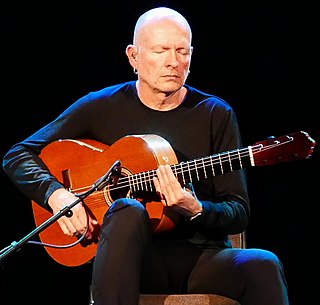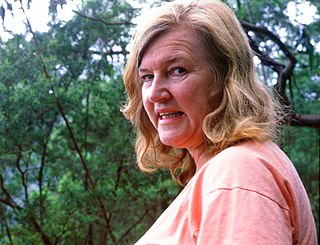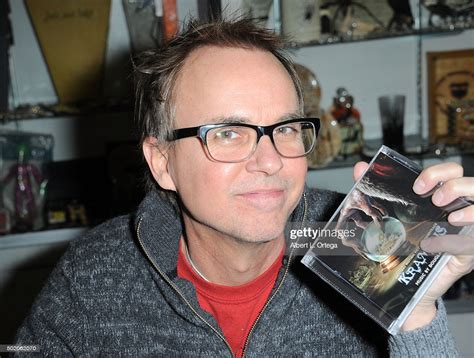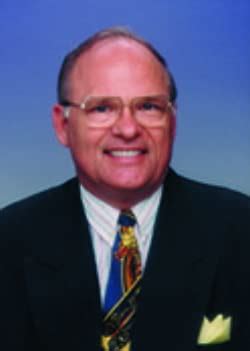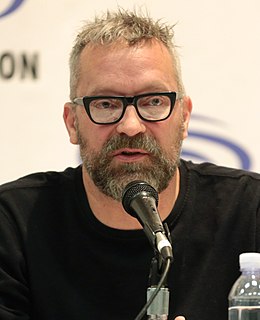Top 313 Instrumental Quotes & Sayings - Page 6
Explore popular Instrumental quotes.
Last updated on November 10, 2024.
If you read about a tree, and there is a description, you have to grow that tree in your mind. So that's an active way of looking at media, whereas a movie or a TV will be passive, because they are showing you the tree. In the same way, when somebody sings a song for you, those words get so much in the foreground, that even if you take a minor key of music and then put like happy lyrics to it and people think it's a happy song. So, in a song, you are told what to feel, whereas, in an instrumental music, you get as much out of it as you are willing to put into it.
To the extent that we hyper-separate ourselves from nature and reduce it conceptually in order to justify domination, we not only lose the ability to empathise and to see the non-human sphere in ethical terms, but also get a false sense of our own character and location that includes an illusory sense of autonomy. The failure to see the non-human domain in the richer terms appropriate to ethics licences supposedly ‘purely instrumental’ relationships that distort our perceptions and enframings, impoverish our relations and make us insensitive to dependencies and interconnections
True drama can be conceived only as resulting from the collective impulse of all the arts to communicate in the most immediate way with a collective public... Thus especially the art of tone, developed with such singular diversity in instrumental music, will realize in the collective artwork its richest potential -- will indeed incite the pantomimic art of dancing in turn to wholly new discoveries and inspire the breath of poetry no less to an undreamed-of fullness. For in its isolation music has formed itself an organ capable of the most immeasurable expression - the orchestra.
most of us persist in regarding leadership as synonymous with - indeed solely derived from - high position. Perhaps the notion of grass-roots leadership strikes us as too much of an oxymoron; confronted with apparent paradox, our imaginations fail. ... I believe that in the future, our ideas about the nature of leadership will undergo a radical transformation. As the instrumental use of knowledge continues to redefine the nature and purpose of organizations, we will begin to look at those on the front lines for leadership.
I was playing in a band and was approached to score an independent film. I had never done it, but had written instrumental music, so I figured I could do it. Turns out I loved scoring the film, and took on another couple films before realizing that if I was to be an effective narrative composer, I should study the craft of composition. I stopped taking projects and got a degree in orchestral music composition, and followed that with film scoring studies. Near the end of my degree studies, I started taking on student films as a way to get back into film scoring.
The whole world will be affected when the apostles and prophets are fully restored. Their supernatural prophetic and apostolic words will signal the rise and fall of many nations and people. They will be instrumental in determining goat and sheep nations so that when Jesus Christ comes He can put the sheep nations on His right and the goat nations on His left. It will not be long until Christians realize the tremendous ways the restoration of prophets and apostles will affect them and the corporate Church.
As you get older - for example, in our band we have members of our orchestra, like Carlos Enriquez and Ali Jackson and Walter Blanning. I taught them when they were in high school, and now they teach me.I'll regularly call Ali and say, "Man, can you break this rhythm down for me?" Or Carlos was actually our music director in Cuba, and he's been instrumental in a lot of my education, and I started to develop a saying with them, because they tease me all the time - you get older, you have that familiar relationship - I say, "You have to follow your young leadership, too."
Our decisions need not be seen as resting on procedures that are merely instrumental in making judgments that are reliably truth-tracking. The procedures might be more directly related than that to truths about what is right or good, or about what we ought to do, or to principles that tell us what is true about these matters. And I have no metaphysical theory about the truth-conditions of such truths, except to say that as objective truths, they must be independent of the attitudes, decisions or actions that they are supposed to justify or for which they are to offer reasons.
I think my music being referred to as "cinematic" has a lot to do with people just not being used to listening to instrumental music without watching a film. I'm still pretty convinced of that. You'll play Chopin in place of something average and like, "Wow, that'd be great in a film." People say it every time, swear to God. I don't think people have a good relationship with instruments and music anymore. But it's definitely visual; I started writing with this band because of the pictures. I can't really deny it either, you know?
I usually start with a guitar riff or some little pattern of chords, and then I kind of go from there. Usually my lyrics are the last thing to go onto a song. For years and years I only ever did instrumental, so I'm still trying to get confidant with my lyrics and find the right balance. I'll generally get inspired from the music. I'll have a guitar line, and then I'll have a melody line, and I hook the lyrics up to fit that rhythm. So, my lyrics to tend be very rhythmic as well. They work with the music rather than the music works around them.
Shallow ecology is anthropocentric, or human-centred. It views humans as above or outside nature, as the source of all value, and ascribes only instrumental, or 'use', value to nature. Deep ecology does not separate humans - or anything else - from the natural environment. It does see the world not as a collection of isolated objects but as a network of phenomena that are fundamentally interconnected and interdependent. Deep ecology recognizes the intrinsic value of all human beings and views humans as just one particular strand in the web of life.
I could be inspired by something I see or something I hear and write down or send to a friend or a writer or whether I have instrumental tracks or just a couple chords recorded on my phone. If I have a couple sessions set, I'll go into the studio with the people I'm lucky enough to call my friends because I feel like I can talk to them and then suddenly our conversations turn into these songs you hear on the radio. I still don't understand how it happens but I talk about my experiences and my situations and everything and then they turn into these amazing pop songs.
That's always attractive to me, to work with music whose form is a big question mark. Even many of my favorite bands growing up, when I was just a kid learning to play drums and guitar and everything, were bands like Pink Floyd, where the arrangement, the number of bars in each section is unconventional and often lopsided, and there will be small little instrumental interludes and that sort of thing. So those odd forms, as well as dark content, are the things that I think are continuous through all the type of projects that I've been attracted to.
